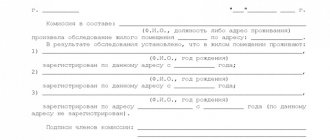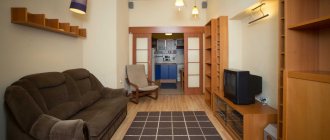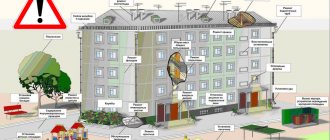Pravozhil.com > Real estate registration > Common areas in a communal apartment - from and to about living in a communal apartment
All residents of communal apartments know that their housing has two territorial units - common areas and personal possessions of citizens. Depending on the location of the tenant in the apartment, his rights and obligations are determined, which he must comply with.
Many citizens living in communal apartments are superficially familiar with the rules of living in such housing, which is not always good.
In order to protect readers of our resource from potential problems, today’s material will examine in as much detail as possible all the rights and obligations of the residents of these apartments, which are enshrined in law and are mandatory for compliance.
Communal apartment: definition, categories of residents
A communal apartment is a property consisting of several residential premises that belong to several owners. As a rule, several families live in an apartment and share common areas: kitchen, hallway, bathroom, toilet.
The law allows that both the owners of their share and tenants can live in an apartment at the same time. Each party has the right to own and use its territory, and the owners can also dispose of the property (Article 30 of the Housing Code of the Russian Federation).
Rights of each household in a communal apartment
Persons who own residential premises in a communal apartment have the right to live in them independently or rent them out. At the same time, the consent of neighbors to move in third parties under the lease agreement is not required. If necessary, they can register tenants in housing.
If you receive housing under a social tenancy agreement, it will be more difficult to rent out your territory. To do this, a number of requirements must be met:
- compliance with living space standards (12 square meters per person);
- written consent of the landlord;
- consent of neighbors in a communal apartment.
Both owners and tenants can accommodate tenants free of charge. The consent of other parties is not required. This rule also applies to guests. In the Rules for the Use of Residential Premises there are no restrictions on the number of guests and the time of their stay. They can use common spaces in a communal apartment on the same basis as owners or tenants. However, their period of residence without registration should not exceed 90 days.
All residents have the same rules for living in a communal apartment. The law does not provide privileges to either party.
If the tenant of municipal housing registers
Municipal property is owned by the municipality, not the residents (they are the tenants). Long-term (over 90 days ) residence in such an apartment without registration will result in a fine. The grounds for registration are regulated by the Housing Code of the Russian Federation (Article 70, Chapter 8).
Third parties
The tenant has the right to register a third party only with the consent of the remaining adult residents and after receiving the approval of the actual owner (the municipality). The standard area for each resident must be taken into account - if, after the arrival of a new neighbor, the share turns out to be less than the standards established in the region, then a refusal will be received.
Relatives
If a relative moves into the apartment, then you do not need to contact the municipal authority, but you will have to obtain the consent of the other residents. There is no need to take into account area standards.
The opinions of the people living in the apartment are not taken into account, and changes are made to the social tenancy agreement if:
- the minor is registered in the living space where his parents (or one of them) are registered;
- The parents, husband or wife of the responsible tenant are registered.
Responsibilities and rights of the new tenant
In the case of municipal housing, the lines between tenants are blurred - the new tenant receives the same rights as everyone else. This is worth taking into account when planning to accommodate a stranger, because he:
- in case of resettlement, exchange, emergency situation, will receive alternative social living space on an equal basis with everyone else;
- will be able to accommodate a minor child or his relatives in the apartment (in the first case, there will be no need to obtain consent from the others);
- submit documents for privatization of “your” part of the living space.
Expert opinion
Semyon Frolov
Lawyer. 7 years of experience. Specialization: family, inheritance, housing law.
If a citizen burdened with credit obligations settles in a communal room, then in order to pay off his debt, bailiffs can seize the property located there or sell it. The real owners will be able to return their honestly acquired property only if they can prove ownership (you must present purchase receipts, deeds of gift, and other documents).
The new tenant receives his share of responsibilities along with his registration. He must take part in paying for housing and communal services, repairs, and maintenance of the apartment.
Registration rules
Need to:
- obtain written consent from all residents and permission from the municipal authority (if the registered person is not a close relative);
- contact the Federal Migration Service at the location of the apartment;
- fill out an application in form No. 6;
- provide the necessary documents.
The package of documents includes:
- passports of the registered person and the responsible tenant;
- rental agreement;
- document on previous registration;
- certificate of family composition;
- other documents upon request (military ID, departure certificate, etc.).
Originals and copies must be provided.
If a child is registering you need:
- parents' passports, marriage certificate and birth certificate;
- Confirmation of registration of parents at the child’s new registration address.
If the parents live separately, then you need to bring a certificate stating that the child is not registered at another address. The other parent should not object to the procedure. The exception is a newborn, whom the mother has the right to register with her without asking permission from the father.
Where to apply?
The registration stamp for the living space is placed in the FMS department, but you can start the registration procedure through:
- State Services portal;
- MFC;
- Homeowners' associations, housing departments, and other bodies with a passport office (the place of application depends on the form of management of the multi-story building).
All registered adult residents of the communal apartment must come. If personal presence is not possible, then it is allowed to act through an intermediary (a power of attorney is required). To complete the procedure, you need to come to the FMS or MFC on the specified day.
If a child over 14 years of age is registering, his personal presence will be required. Until reaching this age, his interests are represented by his parents.
The application contains information about the address of the property, the responsible tenant, and the previous place of residence of the person being registered.
Cost, terms
The procedure is free, but if the applicants decide to use help in filling out the documents, they will have to pay a certain amount to the employees of the HOA and housing department. Since organizations have sample application forms, there is no particular need for such a service. The registration procedure takes 3-7 days .
Is it possible to register without the consent of the residents?
If at least one of those who have a residence permit in the apartment objects to the new tenant’s residence, registration is impossible. It will be possible to bypass this restriction if there are grounds for issuing the “obstacle” itself. These include:
- refusal to pay utility bills (overdue for more than 6 months);
- systematic violation of public order;
- use of the home for other purposes;
- long absence.
In all these cases, you will have to seek an extract through the court.
Appealing a refusal
Registration provides certain benefits. In particular, it makes it possible to:
- use public health services;
- enroll your child in kindergarten or school;
- apply for social benefits;
- open an individual entrepreneur, register with a pension fund, etc.
If you receive an unreasonable refusal, you should go to court. It is recommended to enlist the help of a lawyer, since the outcome of the case largely depends on the correct presentation of the essence of the claim in the claim and on the presentation of the correct arguments. In addition, the lawyer will immediately tell you whether there are grounds for an appeal or not.
Public areas: rights and responsibilities
Each party has the right to use the common territory. By default, you can place furniture or other items on it, but so as not to infringe on the rights of other residents. The common area must not be cluttered. Common property is not subject to sale. All residents have the same rights.
When selling his share in the apartment, the seller is deprived of the right to use the common premises. All issues related to the common territory are resolved through the court.
Repairs to common property are the responsibility of all parties. The decision to carry out repair work can be made by the owners of shares or attracted experts. Upon completion of the work, an estimate is drawn up. Each owner of the premises in the apartment pays for repairs in proportion to his share. If a party refuses to pay, money for repairs is collected through the court.
Noise
Silence mode is set from 23:00 to 07:00. During this period, the noise should not exceed 45 decibels, which is typical for a calm conversation. If the noise level is disturbed, neighbors have the right to call the police. During the day, residents have the right to increase the noise level to 55 decibels. The claims of other parties against them are not legal (Civil Code of the Russian Federation).
Actions that disturb the silence at night in a communal apartment are:
- to the use of radios, amplifiers, tape recorders, televisions when the noise level is exceeded;
- to playing musical instruments, singing and shouting;
- to carry out repair and construction work using powerful tools, resulting in increased noise generation;
- to the use of pyrotechnics;
- other actions that disturb the silence.
A fine of up to 2,000 rubles may be imposed on the violator.
Smoking
There are no laws prohibiting smoking in communal apartments. However, it is forbidden to use public places for smoking, since neighbors are forced to “inhale the smoke of smoldering products” (Federal Law No. 87 “On restricting tobacco smoking”). Neighbors may try to sue the smoking residents or call the local police officer for an instructive conversation.
Animals
The rules for living in a communal apartment with animals are not reflected in Government Resolution No. 25 “On approval of the Rules for the Use of Residential Premises.” Previously, cats and dogs were allowed to stay only with the written consent of all residents. Now there is no such norm. Owners and tenants can keep animals on their property if their neighbors have no contraindications to them. Otherwise, their consent is required.
It is worth noting that animal owners bear full responsibility for sanitary and hygienic cleanliness. If the rights of other parties are violated when animals live in a communal apartment, for example: a dog barks at night, then they can go to court.
Cleaning
This procedure is regulated by the norms of the Housing Code of the Russian Federation and the Civil Code of the Russian Federation. The rules for living in a communal apartment, the “code of responsibility” for which is enshrined in law, only complement these regulations.
Each tenant is obliged to bear the financial burden for maintaining the property of the apartment (Article 43 of the Housing Code of the Russian Federation). The Civil Code only adds that liability must be proportional to the share in the common property.
When cleaning common areas, the number of residents in each room and the owner’s share in the apartment are taken into account. In practice, cleaning is carried out according to a set schedule.
Step-by-step instruction
What papers are required for registration?
To register, you must provide a package of documents from both the owner and the candidate for registration:
- ID confirmation. Passports of two persons are provided.
- Checking eligibility. A title document is submitted (for tenants of municipal property - a social tenancy agreement).
- Written basis. Consent is submitted from the owner of the property and an application for registration (form No. 6 - at the place of residence and form No. 1 - at the place with a limited time stay). An alternative option is to form a collective statement if there are several owners at once.
- Agreement. Papers are provided stating that there are no claims from other owners of the apartment in which the citizen is registered. When living in the municipality, a permit from the landlord is submitted.
Sometimes you may need a departure address sheet , which protects against double registration (when registering permanently). Persons of military age may also be asked to provide a military ID.
What is included in the application?
The document is drawn up by the initiator of the transaction (owner), who indicates the intention to register a certain person (his full name and passport details are indicated). At the same time, the place of registration and data on the consent of the co-owners (if there is a share) are noted. The final part of the procedure includes setting the date and signing the persons.
Where to apply?
Changing the status of a citizen is carried out at the local branch of the Federal Migration Service, MFC or passport office.
Where should I bring it?
Documents are also accepted in the places described above.
Registration deadlines
Registration is completed within three days, but if there is a need to request additional information, this period can extend up to 8 days.
Fact! During the registration period, the passport is temporarily confiscated, and in return, a document is issued that is analogous to an identity card.
Cost and state duty
How much will all the certificates cost? For citizens of the Russian Federation, the registration procedure is provided free of charge. For a citizen of another country, the fee costs 350 rubles.
What document do you need to get?
Successful registration obliges the service that accepted the document to return the passport, in which a new stamp is placed indicating permanent registration. For temporary registration, this procedure is not provided for by law - only Form No. 3 is issued, which records the time frame for registering a person in a given apartment.
After registration in municipal property, a person is automatically registered in the social tenancy agreement.
Payment of utility services
Residents pay utility bills in proportion to their share in the common property.
Option 1 - there are no individual metering devices. In this case, it is carried out by agreement of the parties, for example: depending on the occupied area or the number of residents.
Option 2 - there are metering devices. Each party pays for services according to their own meters, and utilities for the use of the common territory are distributed by agreement.
If the neighbors have not found a compromise, then the rules for paying for services are as follows:
- payment for heating is made in proportion to the share in the property of the apartment;
- payments for water and gas are distributed based on the number of occupants and guests who occupy the premises for more than one month;
- electricity is paid based on the power of the device in each room and their number;
- The item “Maintenance and repair” is paid based on the actual premises(es) and the share in common areas.
The legislation does not establish the obligation of residents to pay utility bills for an unscrupulous, defaulting neighbor.
Redevelopment
The property of a communal apartment is common property, therefore redevelopment is possible only with the consent of all owners and tenants. Moreover, their gesture of goodwill must be formalized in writing and notarized. Otherwise, such an act will result in a hefty fine and a requirement to return the housing to its former configuration.
Neighbors' permission alone is not enough. Permission from the relevant authorities will be required. To obtain it, you must prepare a sketch of the redevelopment and documents confirming ownership of the share. Redevelopment will be refused if it affects load-bearing walls.
What is the difference between temporary registration and permanent registration?
Temporary registration will be required if a citizen will be away from his place of registration for more than 90 days (in particular, this is relevant for students studying away from home). If he lives without registration for more than 90 days, the owner/tenant of the living space will be fined. On state-owned (municipal) housing, the duration of temporary registration should not exceed 6 months (Article 80 of the Housing Code of the Russian Federation). If the housing is privately owned, the time limit increases to 5 years (with the possibility of early termination). In any case, temporary registration at the place of actual residence does not cancel permanent registration. The passport is not stamped (a certificate insert is issued). Upon completion of the specified period, the registration is terminated. We recommend reading: Do I need to check out during temporary registration?
Permanent registration has no term limits. It is impossible to obtain it without an extract from your previous place of residence. When a new tenant arrives, utility bills, provided not according to the meter, but taking into account the number of people, increase. The validity of the registration is terminated upon voluntary discharge or through the court. Confirmation of registration is a stamp in the passport.
How to sell your share: general rules
Here you cannot do without Article 250 of the Civil Code of the Russian Federation. In accordance with it, the priority right to purchase a share is given to neighbors in the communal apartment. If they refuse this privilege, they must provide a written refusal. This document is required to register a transaction for the alienation of property.
Sometimes neighbors do not want to buy a share and do not grant a waiver. In this case, it is necessary to send them written notices certified by a notary. A neighbor is considered not to have been notified unless notice is given to him. Failure to respond within a month after receipt of the document is interpreted as a refusal.
If the owner of the premises in a communal apartment is a minor, then the refusal is granted only with the consent of the guardianship and trusteeship authorities.
There is no need to notify neighbors about the sale of a share if the buyer is the owner of a communal apartment.
If the seller has not notified other owners, he may be refused registration of the transaction. A transaction carried out without notifying neighbors can be challenged in court within one month from the date of sale of the property.
If a neighbor missed the deadline for challenging the transaction for valid reasons, then he can challenge the sale under Article 205 of the Civil Code of the Russian Federation. The rights and obligations of the buyer will be transferred to him and a corresponding entry will be made in the State Register. Read more about selling a room in a communal apartment here.
Concept
Communal housing as a property that includes several residential areas owned by a certain number of owners.
This housing is distinguished by the fact that people running a household and permanently living in it use common places of residence : kitchen, toilet, hallway.
The law allows shareholders and tenants .
Each party has the right to dispose of its own share, and share owners have the opportunity to dispose of their part of the apartment. This norm is ensured by Article 30 of the RF Housing Code .
Subtleties of premises privatization
Privatization applies only to premises rented under a social tenancy agreement. The tenant can transfer one or more premises into his own ownership, but not the communal apartment as a whole.
To carry out privatization, the consent of all family members will be required. If at least one of them does not want to become an owner, then he must provide a notarized refusal.
If minor children live in the room, then the consent of the guardianship and trusteeship authorities will be additionally required. Their decision depends on arguments in favor of the interests of the child. The following requirements must be met:
- the child will be provided with housing equivalent to the previous one;
- sanitary and hygienic requirements will be met at the new location.
During privatization, the consent of neighbors is not required.
How to submit: individual entrepreneur or individual
This question is often pondered by people who rent out their homes on a permanent basis. In fact, this is a constant source of income for them. So maybe you need to register your individual entrepreneur status?
This is not at all necessary. Any citizen has the right to receive income from renting out his home by paying personal income tax. Another thing is that registering an individual entrepreneur gives you the opportunity to choose a taxation option. And the tax paid by an individual entrepreneur may be less than 13% of personal income tax.
However, IP has its own disadvantages:
- Difficulty in obtaining status
- The need not only to pay contributions to the social insurance fund and the Pension Fund, but also to prepare regular reports on them
- The need to maintain accounting records
- Finally, if you sell real estate that generates rental income, you will have to pay all taxes on the sale in full. Citizens are exempt from tax on the sale of their real estate if they have owned it for more than three years.
In other words, the absence of individual entrepreneur status simplifies the rental of real estate, and also allows you to sell a room or apartment at any time, receiving tax benefits. Availability reduces taxes on stably received rental income.
So, whether to register an individual entrepreneur or not, everyone must decide for themselves, based on their own benefits and preferences.
What to do with troublemakers
The rules of living in a communal apartment and the fight against violators are closely interrelated. Every person has the right to protect his interests in the sphere of life and activity (Constitution of the Russian Federation).
If it is impossible to resolve the problem peacefully, the only option to resolve the problem is to file a lawsuit. The concept of a negative claim is associated with communal apartments. It occurs when the rights of residents to common areas are violated. When a court verdict is issued, bailiffs will monitor the fulfillment of obligations under it.
As for silence, you should contact law enforcement agencies. It is advisable to send your request in writing. The competence of these bodies also includes issues related to smoking in public places, storage of toxic substances, damage to property, etc.
In case of illegal redevelopment that threatens the integrity of the house structure, residents can contact the BTI.
According to statistics, about 18% of citizens still live in communal apartments. It is wiser to build relations with neighbors on a friendly note, since legal proceedings will only escalate the situation.
What does the law say?
The legislation regulates issues of relationships between persons living in the same premises where there are places for shared use.
However, not all rules are regulated at the legislative level. There are issues that can only be resolved through negotiations between residents or in the courtroom .
If problematic issues arise, you can refer to the norms of the Housing Code of the Russian Federation . The basic standards for citizens living in a communal apartment are indicated in article number 43 of the Housing Code of the Russian Federation .
It establishes equal standards for residents spending time in the same room. The right to use a residential property is no different for both owners and tenants.
The rules for legal housekeeping are the same for each resident.
A residential property is a separate premises belonging to real estate. Its conditions are suitable for residential purposes. This norm is defined by paragraph 1. Article 15 of the Housing Code of the Russian Federation .
Paragraph 2 of Article 209 of the Civil Code of the Russian Federation allows the owner to perform any actions with his property that do not contradict the law.
How to rent out a room yourself
All potential tenants are well aware that by contacting an agency, they “lose” a whole month’s rent. This is the amount of remuneration that realtors usually demand. And since room renters are usually poor people, they would prefer to avoid these costs. That is, rent a room directly from the owner.
Therefore, it is not at all difficult for a potential landlord to find a client, in turn, bypassing the agency. To simplify the procedure, you need to provide the advertisement with a photograph of the premises for rent. And then place it on any electronic platform - from Avito to thematic public pages on social networks.
Or even on a regular bulletin board. By the way, the location of the “analog” bulletin board can help you reach exactly the “target audience” to whom you expect to rent out the room. For example, if you are looking for a female student, it is advisable to place advertisements near educational institutions.
When self-testing, it is especially important to publish reliable data. Attempts to “embellish the product being sold” will only lead to wasted time on fruitless inspections. It is also important to correctly describe the infrastructure of the area: the presence of nearby shops, children's and medical institutions, recreation areas, and a transport system. For large cities, transport issues are especially important.
When it comes to personal negotiations, you need to discuss:
- Amount and procedure of rent
- Deadline
- The presence or absence of a so-called “deposit” - usually this is payment in advance for the last month of stay
- Rules for the use of common areas or special requirements. For example, a condition that the tenant will not gather noisy parties in his room.
After the parties have discussed everything and come to an agreement, an agreement should be drawn up. A sample of it can be found on the Internet. Downloading a blank form is easy.
Ways to rent out a room
The division of labor has not yet been abolished, so the owner of the room can do it in two ways:
- Find tenants on your own
- Entrust this case to a special agent or agency
Modern busy people often prefer to act through agents. Moreover, both landlords and tenants. The participation of an “official” in the matter gives people a sense of security and legitimacy of the transaction. And not just a feeling. Agents really take care of all the official hassle associated with paperwork.
A rental agreement concluded by an agent will be accepted in any authority as proof that the citizen actually lives at this address.
As a rule, the contract is concluded for a year. Subsequently, it can be automatically renewed under the same or modified conditions. And then register it with Rosreestr. You can also contact a realtor or agency for help in this matter.
However, you will have to pay for help. From tenants, the agent usually takes a commission equal to one month's rent, and from the landlord several separate payments:
- For searching for tenants
- For concluding a contract
- For registering a transaction in Rosreestr
So, each landlord, again, must decide for himself what is more profitable for him - to pay a specialist, or to spend his time and effort on all these operations.
Preparation for delivery
“Pre-sale preparation” when renting out an apartment is no less important than when selling it. Realtors claim that proper preparation increases the rental price by an average of 30-50%. Not to mention the fact that there are significantly more people wanting to take it off. This means that the landlord has more choice.
Before renting out a room you should:
- Make cosmetic repairs or general cleaning
- Place furniture, household appliances, hang lampshades and curtains.
- Check plumbing equipment, repair or replace it if necessary
- Remove valuable or memorable things for the owner, as well as unnecessary items from the premises
- Pay off rent debts
- Put the title documents for housing in order (they will definitely be checked, either by the agent or the potential residents themselves, to make sure that the transaction is legal)
Payment of taxes for renting out a room
If the lease agreement is formalized and registered with Rosreestr, the landlord is obliged to pay tax on the income received from renting out housing - personal income tax. It is 13% (the same amount is deducted from each official salary). But unlike an employee who pays personal income tax monthly and automatically, the owner of a rental property is required to pay the tax once - for the entire year at once.
It is necessary to fill out and submit the 3-NDFL declaration to the Federal Tax Service by April 30 of the year following the reporting year. And pay the calculated amount no later than July 15 of the same year. For failure to submit a return on time or delay in payment, the Federal Tax Service will fine the taxpayer.
A copy of the lease agreement and a bank account statement are considered proof of the amount of income received. If payment was made in cash - receipts.
It is not difficult to fill out the declaration. It indicates the income received, expenses incurred and the actual amount of tax. If the room was not rented for a full year, but only for a few months, a zero is entered in the column where the amount of rent is entered.
What else should you pay attention to?
Summarizing all of the above, we want to give our readers some useful practical tips:
- Before you decide to rent out a room, weigh everything carefully and think it over
- Conclude contracts with residents only if they have a passport. It is advisable to additionally ask for additional identification if you have one (driver's license, student ID)
- When you rent out a room for the first time, it is better to do this with the help of an agent. Once you carefully observe the procedure, in the future you will be able to successfully do everything yourself. At the same time, the contract drawn up by a specialist will serve as a model for you in the future.
- Don't forget about the deposit. If everything goes according to plan, it will become the last month's payment. If difficulties arise, you will at least reduce your material losses.
- File your taxes and pay your taxes on time










